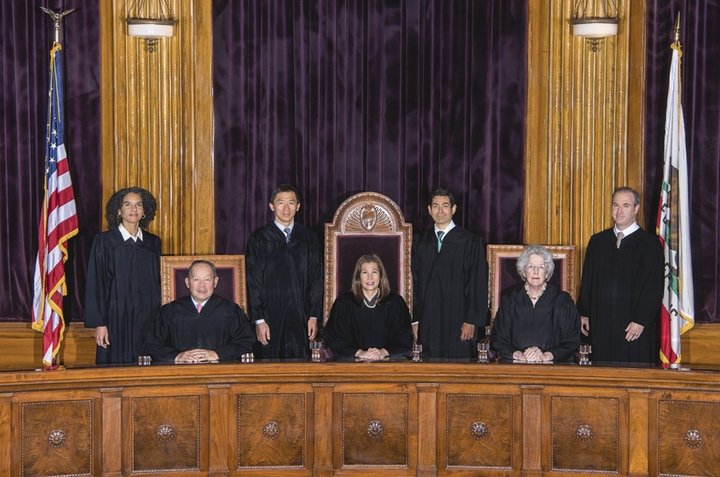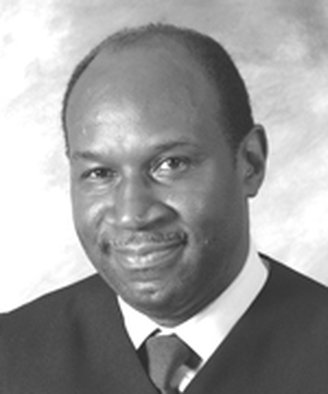
Justices of the Supreme Court of California. Judge Martin Jenkins has been appointed to the state’s highest court following the retirement of Justice Ming W. Chin, bottom left, in August. Photo via California Courts
###
Making his first appointment to the California Supreme Court, Gov. Gavin Newsom today announced his pick: retired Justice Martin Jenkins, who would be the court’s first openly gay justice.
If confirmed, Jenkins, born and raised in the Bay Area, would also be only the third Black man to serve as a justice in the state court’s history, and the first in 29 years.

Martin Jenkins. Photo via California Courts.
Newsom, in a statement, called Jenkins widely respected and “a decent man to his core.” In the past two years, he has been Newsom’s judicial appointments secretary.
A San Francisco native, Jenkins grew up cleaning office buildings and churches with his father, who was a clerk for the city and county of San Francisco and a janitor.
Jenkins graduated from Santa Clara University and the University of San Francisco Law School. After working as a prosecutor for Alameda County District Attorney’s Office, he was appointed by former President Ronald Reagan as a trial attorney in the civil rights division of the U.S. Department of Justice.
President Bill Clinton later named him to the U.S. District Court for the Northern District of California, and then-Gov. Arnold Schwarzenegger appointed him to the California Court of Appeal, First Appellate District, where he served from 2008 to 2019.
“Nobody stayed in the office later than Marty,” retired Senior U.S. District Judge Thelton Henderson said in a statement released by the governor’s office. “He was intensely aware that real people’s lives were affected by his rulings and wanted to make sure he got it right. That’s the kind of man he is.”
Jenkins’ name has appeared in several high-profile cases. In 2018, the appeals court, in a 3-0 ruling, cleared the way for disciplinary action against San Francisco officers who sent racist, sexist, and homophobic text messages. He also voted to toss out a case against automakers brought by then-Attorney General Jerry Brown, who had sued six of the world’s largest automakers for damages related to global warming.
Jenkins ruled that a court “injecting itself into the global warming thicket at this juncture would require an initial policy determination of the type reserved for the political branches of government.”
If confirmed, Jenkins would replace Supreme Court Justice Ming Chin, who recently retired.
How the process works: The governor will submit his name to the State Bar’s Commission on Judicial Nominees and Evaluation. Justices are confirmed by the Commission on Judicial Appointments, which consists of California’s Chief Justice, the State Attorney General, and the senior presiding Justice of the Court of Appeal J. Anthony Kline.
What to know about the California Supreme Court
Unlike the U.S. Supreme Court, which in recent years has often split 5-4 on key decisions, the state Supreme Court has been a model of 7-0 votes of unanimity. In fact, this year the state justices have issued unanimous rulings 90% of the time, according to a San Francisco Chronicle analysis — a feat the court has managed in 75% to 80% of its cases for most of the past decade.
Compare that to the U.S. Supreme Court , which in its last term reached unanimous decisions just 36% of the time.
Unlike the U.S. Supreme Court, which in recent years has often split 5-4 on key decisions, the California Supreme Court has been a model of 7-0 votes of unanimity.
Among its recent decisions, the state court rejected a law adopted by state’s Democratic lawmakers and Gov. Gavin Newsom that would have barred presidential candidates from appearing on the California ballot unless they released their tax returns. It was a political broadside clearly aimed at President Donald Trump, which the court unanimously swatted away.
California Chief Justice Tani Cantil-Sakauye has led the court since 2011 and was a Republican for most of her tenure on the court. But she quietly changed her registration to “no party preference,” she told CalMatters, after watching the U.S. Senate confirmation hearings in which U.S. Supreme Court Justice Brett Kavanaugh denied a Palo Alto professor’s testimony that he assaulted her when they were high school students.
“I’ve been thinking about it for some time,” Cantil-Sakauye said, adding that what she heard from her husband and friends was “you didn’t leave the party. The party left you.”
The court itself now strikes a moderate pose.
Long gone are the days when the state Supreme Court was a lightning rod for controversy. It was unprecedented in 1986 when California voters — upset that the court was delaying capital punishment cases — voted not to grant Chief Justice Rose Bird and two other liberal justices new 12-year court terms. The court was then led by a majority appointed by Republican governors for the next three decades, with the balance tipping back to a majority appointed by Democratic governors in 2017.
###
CALmatters.org is a nonprofit, nonpartisan media venture explaining California policies and politics.
CLICK TO MANAGE